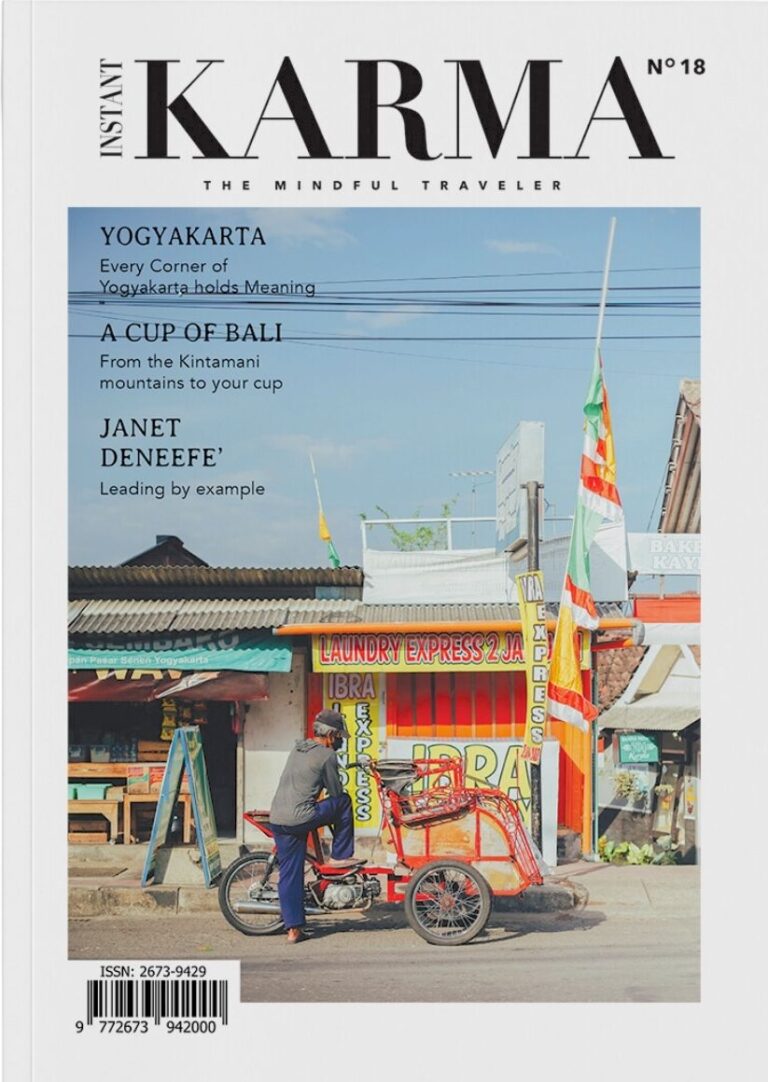A little history of Bali coffee
Let’s explore the journey of Bali Coffee from the Kintamani mountains to your cup. Indonesia has excellent conditions for growing coffee; however, it didn’t grow here until the Arabica plant was brought to the archipelago by the Dutch in the 17th century.
The first plantations were established in Jakarta and then spread throughout Java, Sulawesi, and Sumatra.
Eventually, Balinese farmers started growing coffee too, and Kintamani has everything coffee plants need to thrive.
Respecting nature is important in this business as many coffee properties depend on the conditions in which it is grown.
Most Balinese farmers follow the philosophy of Tri Hita Karana, which is applied to basically everything in Bali.
It means one has to maintain good relationships with God, nature, and people. And Balinese do.
Some farmers grow coffee with orange trees as they are believed to give the coffee a citrus taste. While others believe it doesn’t affect coffee. “Altitude and soil are what matters, these are the most important,” – says Ayu Sudana, the founder of Bali Beans Coffee and daughter of coffee farmers.
Many coffee farms in Bali have existed for generations, and those like Ayu Sudana continue the family business. In previous generations, farmers would sell coffee cherries for pennies. They sold it to middlemen, who sold it abroad, and the farmers got little money for their hard work.
Because of this, farmers advised their children against growing coffee. Nowadays, their children are changing the situation, ensuring farmers get fairly rewarded, and Bali coffee is appreciated the way it deserves to be.
In Bali, harvesting time is one to three months during summer, but coffee plants require care all year round. “After harvesting, the crop is left for 1-3 days to let sugar from the cherries ferment the beans inside.
There are multiple ways to process the coffee before drying it. Beans can be extracted from cherries and washed. Or they can be extracted and left to dry with pulp. It’s called honey processed, giving the beans a fruity tinge.
The third way is to let coffee cherries dry and extract the beans afterward,” – says Agung Semaradana. He is a coffee farmer in the third generation. He knows all the peculiarities of growing good coffee and how it used to be underappreciated.
Now he arranges tours to his farm to spread the word about small family-run farms and great Balinese coffee.
There is also another way of processing beans that is unique to Indonesia. It’s called wet-hulled.
Wet-hulling emphasizes body and mutes acidity (while wet-processing accentuates delicate acidity and sweetness).
The texture and body are very hard. It’s perfect to use as a base for a blend and then add others. It takes a couple of weeks before the beans are sent to roasteries.
There are a number of coffee roasteries in Bali alone.
EXPAT Roastery has been around for quite a while and sources 98% of coffee beans from Indonesian farmers. “Here in Expat, we basically get coffee from all around the world but mainly from Indonesia. For example, our Nomad blend is 100% Indonesian beans.
It’s a mix of Sumatran and Balinese”, Bebe says, EXPAT’s Head of Coffee. “What’s making it different is the processing. Different methods will result in different acidity, body, and sweetness.”
While acidity and sweetness are self-explanatory, what is the body of coffee?
Simply put, it’s the texture and thickness of the drink. The fuller the body, the thicker it feels.
“Normally, in the full-wash process, we highlight acidity more. When acidity is very high, then the body will be slightly lower. What I found with the East Javanese coffee is that the texture of the body is quite similar to the acidity. But compared to Bali coffee it has more body.”
Roasting is a complicated process as well.
There are different roast profiles for different coffee origins. A Roast profile is a set of parameters such as temperature, time, batch size, and others.
“Green beans have certain moisture and density; we will consider this aspect when we create a profile. After drying, there comes the browning stage, when a chemical reaction will happen, which means breaking down the sugar compound and amino acids, and the taste and aroma will change.
The longer the roasting time is, the darker the Bali coffee. One of the most significant differences between espresso and filter roasts is the length of the roasting process. Espresso roasts are typically roasted for a more extended period, which creates a darker roast and enhances the coffee’s body.
EXPAT Roastery not only roasts coffee and supplies coffee shops but also teaches baristas how to brew their coffee right and do quality checks. Even if the coffee beans are good, mistakes while brewing can spoil everything. There are multiple ways to grind and brew coffee. We got used to coffee machines, but you don’t need one to prepare a cup of strong, thick Bali coffee.
“You know Bali is so relaxed and chilled, so to make it easier, we just make coffee in the cup and leave the powder,” Ayu Sudana laughs, telling the story of Bali coffee.
“People in every country consume coffee daily,
but there are only 28 countries that produce coffee”
Indonesia is the fourth biggest coffee supplier in the world. And every country has its own way to brew coffee. For example, French press is basically Bali kopi but without powder in your cup.”
The biggest and most popular roasteries, including but not limited to EXPAT and Bali Beans, mostly use locally sourced beans, Balinese and Indonesian. Farmers work sustainably, ensuring they give back to the land and gods.
Roasteries and cafes pay the full price and give back to the community.
We, as customers, can express our gratitude to the baristas and waiters serving coffee and the teams of people who stand behind that morning cup and keep us coming back for more.
So, next time you order your daily dose of espresso or latte in a stylish coffee shop, chances are you’re still drinking Bali Kopi.
–
Thanks to EXPAT Roasters & Bali Beans for supporting this article about Bali coffee.
Learn more on their Websites






